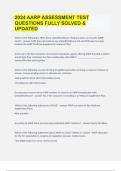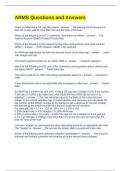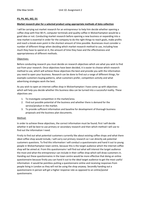Philosophy of Science in Practice
Inhoudsopgave
Week 1...............................................................................................................................2
Lecture 1:......................................................................................................................................2
Karl Popper – Science: Conjectures and Refutations......................................................................4
Thomas Kuhn – Progress through Revolutions..............................................................................6
Week 2...............................................................................................................................7
Lecture 2: Lakatos and Laudan......................................................................................................7
Imre Lakatos – Criticism and Methodology of Scientific Research Programmes............................8
Larry Laudan – From Theories to Research Traditions...................................................................9
Week 3.............................................................................................................................11
Lecture 3.....................................................................................................................................11
Morrison and Morgan - Models as mediating instruments..........................................................12
Ronald Giere – How Models Are Used to Represent Reality........................................................14
Week 4.............................................................................................................................16
Lecture 4.....................................................................................................................................16
Tarja Knuuttila – Modelling and representing: An artefactual approach to model-based
representation............................................................................................................................17
Peter Godfrey-Smith – The strategy of model-based science.......................................................19
Week 5.............................................................................................................................21
Lecture 5.....................................................................................................................................21
Helen Longino – Values and Objectivity.......................................................................................22
Heather Douglas – Inductive Risk and Values in Science..............................................................24
Week 6.............................................................................................................................25
Lecture 6: Value-Ladenness of Modeling.....................................................................................25
Kristen Intemann – Distinguishing between legitimate and illegitimate values in climate
modeling.....................................................................................................................................26
Kevin Elliott and Daniel McKaughan – Nonepistemic Values and the Multiple Goals of Science..28
,Week 1
Lecture 1:
Assumptions are necessary to connect your hypothesis with the real world and make
empirical predictions.
Through testing the prediction of the hypothesis, you test your hypothesis.
Premise 1: Hypothesis with auxiliary assumptions leads to/entails your prediction (H+A->P)
Premise 2: Prediction is true (P)
Conclusion: Hypothesis with auxiliary assumptions is true (H+A)
However, this is an invalid form (affirming the consequent). Therefore, a true prediction
doesn’t mean that the hypothesis (+assumptions) is necessarily true. Also, different
predictions can arise or different assumptions can be used and this might lead to a different
conclusion about the hypothesis. A hypothesis is not yet true for all possible predictions.
If prediction turns out false:
Premise 2: Prediction is false (not-P)
Conclusion: Hypothesis + assumptions is false (not-(H + A))
This is a valid form of argument. This is falsification. Popper thinks this is valid, while
confirmation (the previous type) isn’t. However, it could also be that your assumptions are
wrong. Therefore, you don’t have sufficient reason to say your hypothesis is false.
We deduce the predictions from the hypothesis (and the auxiliary assumptions) in the
hypothetico-deductive model of the scientific method.
It’s inductive to go from some observations in the world to a question. The formulation of
the hypothesis is therefore tentative and can’t be said to be really ‘true’.
For Kuhn, not the hypothesis, but the paradigm is the main element of the scientific method.
(Lecture 2)
Vienna Circle, logical positivist, like Carnap. They say only scientific statements are
meaningful statements. They distinguished analytic and synthetic statements, and only
those are meaningful.
Popper criticized the logical positivists. He thinks pseudo-science can also have meaning,
Popper doesn’t really care about that.
Verification -> induction -> not secure knowledge and no new knowledge, because their
predictions can’t be tested. With predictions, you can obtain novel knowledge.
Risky prediction means that is empirically testable.
, Does Popper mean not testable right now or in principle? It might be hard to find a
hypothesis that is not testable in principle.
Corroborating evidence is evidence that is the result of a genuine, but unsuccessful test to
falsify a theory.
Duhem-Quine problem (problem of underdetermination):
It is impossible to test a scientific hypothesis in isolation as it requires one or more
background assumptions.
You’re testing your hypothesis with the auxiliary assumptions.
Another problem: some justifiable scientific claims are not falsifiable (like probabilistic
statements)
Progress for Popper in science happens through conjecturing hypotheses and falsifying
them. This cycle contains the progress.
Paradigm shift are not rational choices, according to Kuhn, more like religious conversions.
This is why you can’t distinguish science from pseudo-science.
Progress can happen for Kuhn when within a paradigm more phenomena are explained, but
also when new paradigms are able to explain more phenomena. A criticism is that paradigms
are incommensurable, so how can you say that there really is progress? Kuhn feels like there
is progress, but it is hard to say how this is quantified. It is therefore also said that
incommensurability is not as absolute as Kuhn proposes it to be.
Inhoudsopgave
Week 1...............................................................................................................................2
Lecture 1:......................................................................................................................................2
Karl Popper – Science: Conjectures and Refutations......................................................................4
Thomas Kuhn – Progress through Revolutions..............................................................................6
Week 2...............................................................................................................................7
Lecture 2: Lakatos and Laudan......................................................................................................7
Imre Lakatos – Criticism and Methodology of Scientific Research Programmes............................8
Larry Laudan – From Theories to Research Traditions...................................................................9
Week 3.............................................................................................................................11
Lecture 3.....................................................................................................................................11
Morrison and Morgan - Models as mediating instruments..........................................................12
Ronald Giere – How Models Are Used to Represent Reality........................................................14
Week 4.............................................................................................................................16
Lecture 4.....................................................................................................................................16
Tarja Knuuttila – Modelling and representing: An artefactual approach to model-based
representation............................................................................................................................17
Peter Godfrey-Smith – The strategy of model-based science.......................................................19
Week 5.............................................................................................................................21
Lecture 5.....................................................................................................................................21
Helen Longino – Values and Objectivity.......................................................................................22
Heather Douglas – Inductive Risk and Values in Science..............................................................24
Week 6.............................................................................................................................25
Lecture 6: Value-Ladenness of Modeling.....................................................................................25
Kristen Intemann – Distinguishing between legitimate and illegitimate values in climate
modeling.....................................................................................................................................26
Kevin Elliott and Daniel McKaughan – Nonepistemic Values and the Multiple Goals of Science..28
,Week 1
Lecture 1:
Assumptions are necessary to connect your hypothesis with the real world and make
empirical predictions.
Through testing the prediction of the hypothesis, you test your hypothesis.
Premise 1: Hypothesis with auxiliary assumptions leads to/entails your prediction (H+A->P)
Premise 2: Prediction is true (P)
Conclusion: Hypothesis with auxiliary assumptions is true (H+A)
However, this is an invalid form (affirming the consequent). Therefore, a true prediction
doesn’t mean that the hypothesis (+assumptions) is necessarily true. Also, different
predictions can arise or different assumptions can be used and this might lead to a different
conclusion about the hypothesis. A hypothesis is not yet true for all possible predictions.
If prediction turns out false:
Premise 2: Prediction is false (not-P)
Conclusion: Hypothesis + assumptions is false (not-(H + A))
This is a valid form of argument. This is falsification. Popper thinks this is valid, while
confirmation (the previous type) isn’t. However, it could also be that your assumptions are
wrong. Therefore, you don’t have sufficient reason to say your hypothesis is false.
We deduce the predictions from the hypothesis (and the auxiliary assumptions) in the
hypothetico-deductive model of the scientific method.
It’s inductive to go from some observations in the world to a question. The formulation of
the hypothesis is therefore tentative and can’t be said to be really ‘true’.
For Kuhn, not the hypothesis, but the paradigm is the main element of the scientific method.
(Lecture 2)
Vienna Circle, logical positivist, like Carnap. They say only scientific statements are
meaningful statements. They distinguished analytic and synthetic statements, and only
those are meaningful.
Popper criticized the logical positivists. He thinks pseudo-science can also have meaning,
Popper doesn’t really care about that.
Verification -> induction -> not secure knowledge and no new knowledge, because their
predictions can’t be tested. With predictions, you can obtain novel knowledge.
Risky prediction means that is empirically testable.
, Does Popper mean not testable right now or in principle? It might be hard to find a
hypothesis that is not testable in principle.
Corroborating evidence is evidence that is the result of a genuine, but unsuccessful test to
falsify a theory.
Duhem-Quine problem (problem of underdetermination):
It is impossible to test a scientific hypothesis in isolation as it requires one or more
background assumptions.
You’re testing your hypothesis with the auxiliary assumptions.
Another problem: some justifiable scientific claims are not falsifiable (like probabilistic
statements)
Progress for Popper in science happens through conjecturing hypotheses and falsifying
them. This cycle contains the progress.
Paradigm shift are not rational choices, according to Kuhn, more like religious conversions.
This is why you can’t distinguish science from pseudo-science.
Progress can happen for Kuhn when within a paradigm more phenomena are explained, but
also when new paradigms are able to explain more phenomena. A criticism is that paradigms
are incommensurable, so how can you say that there really is progress? Kuhn feels like there
is progress, but it is hard to say how this is quantified. It is therefore also said that
incommensurability is not as absolute as Kuhn proposes it to be.





